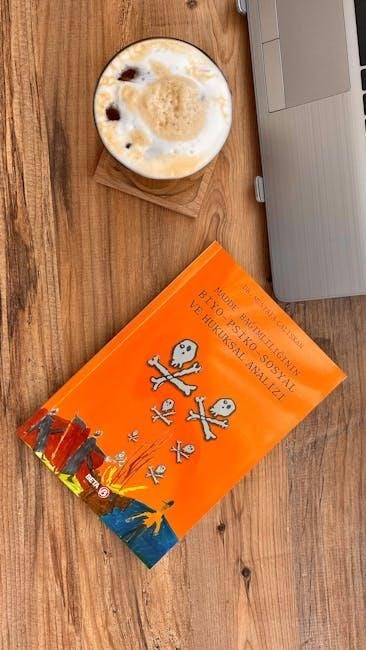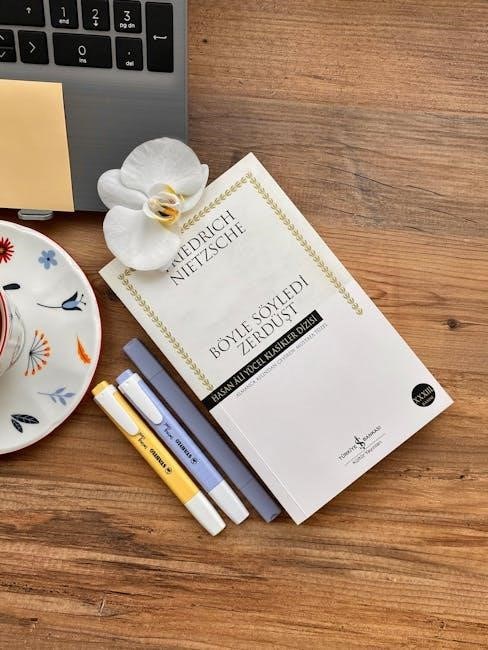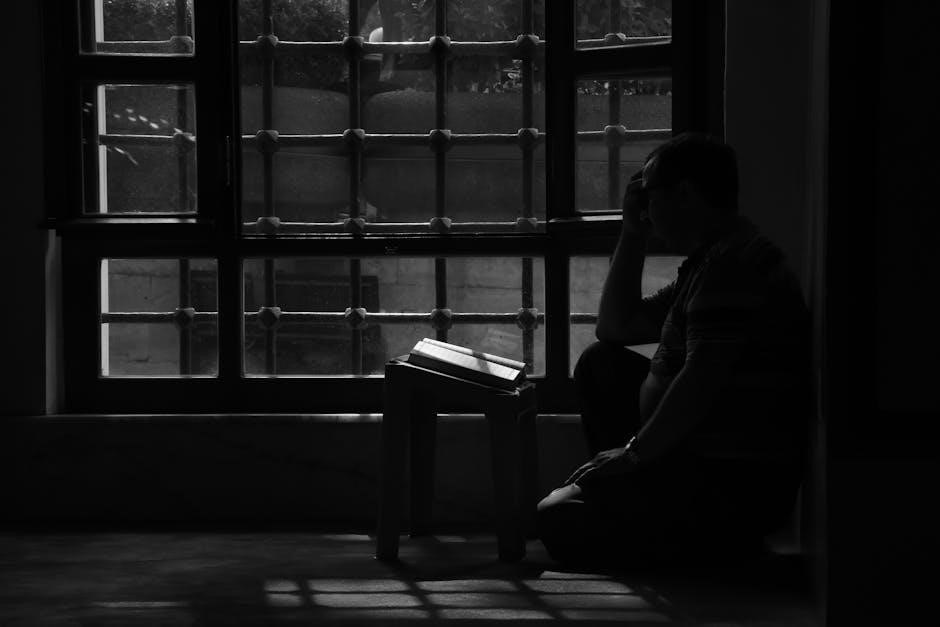
Article Plan: The Book Thief PDF
We will explore Markus Zusak’s profound novel, “The Book Thief,” detailing its key elements. This includes an overview of the story, Liesel Meminger’s journey, and the World War II setting. We’ll analyze the power of words, the act of stealing books as survival, PDF availability, and free download options.
Overview of “The Book Thief”
Markus Zusak’s “The Book Thief” is a powerful and poignant historical fiction novel set in Nazi Germany during World War II. Narrated by Death, the story follows Liesel Meminger, a young girl who finds solace and strength in stolen books amidst the chaos and destruction of war. Liesel arrives in the small town of Molching, Germany, to live with her foster parents, Hans and Rosa Hubermann.
As Liesel navigates her new life, she discovers the power of words and literature, using them as a means of survival, comfort, and resistance against the oppressive regime. The novel explores themes of love, loss, resilience, and the importance of human connection in the face of adversity. “The Book Thief” offers a unique perspective on the war, focusing on the experiences of ordinary German citizens and the impact of Nazi ideology on their lives. Through Liesel’s journey, Zusak highlights the transformative power of stories and their ability to shape our understanding of the world. The narrative weaves together elements of hope, despair, and ultimately, the enduring human spirit.
Liesel Meminger’s Story
Liesel Meminger’s journey is the heart of “The Book Thief.” Abandoned by her mother and grieving the death of her younger brother, Liesel arrives at Himmel Street, a frightened and illiterate young girl. Her foster parents, Hans and Rosa Hubermann, provide a semblance of stability, with Hans becoming her anchor and mentor. He patiently teaches her to read, igniting a passion for words that will define her existence.
As Liesel’s world is increasingly shaped by the war, she begins stealing books – initially out of compulsion and later as an act of defiance. These stolen words become her refuge, offering an escape from the horrors around her. Her relationship with Max Vandenburg, a young Jewish man hiding in her basement, further deepens her understanding of the world and the power of compassion. Liesel’s story is one of resilience, as she confronts loss, prejudice, and the constant threat of danger, ultimately finding strength in the bonds of family, friendship, and the written word. She transforms from a scared child into a young woman who understands the importance of empathy and the enduring power of stories.

World War II Setting
“The Book Thief” is deeply rooted in the harrowing backdrop of World War II Germany. The narrative vividly portrays the pervasive atmosphere of fear, propaganda, and persecution that defined the era. The story unfolds in the small town of Molching, offering a glimpse into the lives of ordinary German citizens struggling to survive amidst the growing Nazi regime. The constant threat of air raids, the chilling presence of the Gestapo, and the forced participation in Nazi rallies create a palpable sense of unease.

The novel explores the impact of war on individuals and communities, highlighting the moral dilemmas faced by ordinary people caught in extraordinary circumstances. The characters grapple with questions of complicity, resistance, and the preservation of humanity in the face of unimaginable cruelty. The setting serves not only as a historical context but also as a powerful force that shapes the characters’ actions, beliefs, and ultimately, their destinies; The war’s pervasive influence underscores the importance of empathy, compassion, and the enduring power of human connection in the darkest of times. The historical accuracy of the setting enhances the novel’s emotional impact, making Liesel’s story all the more compelling and relevant.

The Power of Words
A central theme in “The Book Thief” is the profound power of words. Liesel Meminger discovers that words can be both a source of comfort and a tool of manipulation. Initially, words are foreign and intimidating to her, but as she learns to read, she unlocks a world of knowledge, imagination, and self-discovery. The stolen books become her treasures, offering solace from the harsh realities of war-torn Germany.
Words provide Liesel with an escape, allowing her to create her own narratives and make sense of the chaos around her. They also empower her to connect with others, sharing stories and fostering empathy in a time of widespread hatred. However, the novel also explores the destructive potential of words, particularly in the form of Nazi propaganda. The manipulation of language is used to incite hatred, control populations, and justify atrocities. Zusak masterfully illustrates how words can be wielded as weapons, shaping perceptions and influencing behavior. Ultimately, “The Book Thief” emphasizes the importance of critical thinking and the responsible use of language in a world where words hold immense power.
Stealing Books as Survival
In “The Book Thief,” Liesel’s act of stealing books transcends simple theft; it becomes a form of survival. In the bleak landscape of Nazi Germany, where hope is scarce and life is precarious, Liesel clings to books as a means of preserving her humanity and finding meaning in a world consumed by darkness. Her initial act of stealing “The Grave Digger’s Handbook” marks the beginning of her literary journey, a journey fueled by a desperate need for connection and understanding.
As Liesel continues to steal books, she not only acquires knowledge but also defies the oppressive regime that seeks to control every aspect of people’s lives. Each stolen book represents a small act of rebellion, a refusal to succumb to the prevailing ideology. The books offer her comfort, companionship, and a sense of identity in a world where she feels lost and alone. They become her refuge, a sanctuary where she can escape the horrors of war and find solace in the power of storytelling. Through her acts of literary rebellion, Liesel demonstrates the resilience of the human spirit and the enduring power of words to sustain hope in the face of adversity.

PDF Availability

The digital age has made literature more accessible than ever, and “The Book Thief” is no exception. A PDF version of Markus Zusak’s acclaimed novel is readily available across various online platforms. This widespread availability allows readers around the globe to easily access and engage with Liesel Meminger’s poignant story, regardless of their geographical location or access to physical bookstores.

Numerous websites offer “The Book Thief” in PDF format, often as a free download or as part of a digital library subscription. Online archives, such as Internet Archive, provide scanned versions of the book, while other platforms host user-uploaded PDFs. The ease of access to the PDF version of “The Book Thief” has undoubtedly contributed to its enduring popularity and widespread readership. It allows students, book clubs, and individual readers to delve into the novel’s themes of survival, the power of words, and the human spirit’s resilience during wartime.
Free PDF Downloads
The allure of free PDF downloads of “The Book Thief” is undeniable, offering a cost-effective way to explore Markus Zusak’s powerful narrative. Many websites and online repositories provide access to the novel in PDF format without charge, making it accessible to a broader audience, especially students and readers on a budget. However, it’s crucial to exercise caution and prioritize legitimate sources when seeking these free downloads.
While the prospect of acquiring the book for free is tempting, downloading from unofficial or unverified websites carries risks. These sites may host pirated copies of the book, which infringe on copyright laws and potentially expose users to malware or viruses. To ensure a safe and legal experience, consider exploring reputable online libraries, educational platforms, or websites that offer officially licensed free downloads as part of promotional campaigns or educational initiatives. Always verify the source’s credibility before downloading any files to protect your device and respect the author’s intellectual property.
Online Reading Options
Beyond the realm of PDF downloads, numerous online reading options provide convenient access to “The Book Thief.” Platforms such as online libraries, subscription services, and dedicated e-reading apps offer digital versions of the novel that can be accessed on various devices, including computers, tablets, and smartphones. These options often come with features like adjustable font sizes, built-in dictionaries, and the ability to bookmark pages, enhancing the reading experience.

Many online platforms offer free trials or subscription models, allowing readers to explore “The Book Thief” without an initial purchase. Some websites even provide free access to the novel through online readers, supported by advertisements or sponsored content. These online reading options are particularly appealing to those who prefer the flexibility of reading on the go or who wish to sample the book before committing to a physical copy or digital download. Furthermore, online platforms often facilitate discussions and book clubs, fostering a sense of community among readers of “The Book Thief.”
Markus Zusak’s Writing Style
Markus Zusak’s writing style in “The Book Thief” is distinctive and deeply affecting. The narrative voice, unusually, is that of Death, lending a unique perspective to the story of Liesel Meminger. This personification of Death is not morbid but rather philosophical and, at times, even compassionate, offering insightful commentary on the human condition amidst the horrors of World War II. Zusak’s prose is lyrical and evocative, employing vivid imagery and figurative language to paint a compelling picture of Liesel’s world.
His use of short, impactful sentences and fragmented thoughts creates a sense of immediacy and emotional intensity. Zusak masterfully weaves together elements of dark humor and profound sadness, capturing the complexities of life during wartime. He also incorporates German words and phrases throughout the text, adding authenticity and cultural richness to the narrative. The author’s ability to blend historical accuracy with imaginative storytelling is a hallmark of his writing style, making “The Book Thief” a memorable and thought-provoking read. Zusak’s writing style is truly unique.
Themes in the Novel
“The Book Thief” explores several profound themes, most notably the power of words. Liesel’s journey revolves around her discovery of language as a means of survival, comfort, and resistance against the oppressive Nazi regime. Stealing books becomes an act of defiance, allowing her to create her own world and challenge the prevailing ideology. Another significant theme is the impact of war on innocence, as Liesel witnesses firsthand the brutality and senselessness of conflict.

The novel also delves into the themes of love, friendship, and loyalty, exemplified by Liesel’s relationships with Hans Hubermann, Rosa Hubermann, and Rudy Steiner. These bonds provide her with a sense of belonging and hope amidst the chaos. Furthermore, the book examines the complexities of morality, questioning the nature of good and evil in extreme circumstances. The courage and compassion displayed by ordinary people in the face of adversity are central to the narrative, highlighting the resilience of the human spirit. Zusak explores complex themes.

Historical Fiction Context
“The Book Thief” is firmly rooted in the historical context of World War II and Nazi Germany, offering a unique perspective on this period through the eyes of a young girl. The novel provides insights into the daily lives of ordinary German citizens, exploring their struggles, fears, and moral dilemmas under a totalitarian regime. Zusak accurately portrays the pervasive atmosphere of propaganda, fear, and suspicion that characterized Nazi society.
The book also sheds light on the persecution of Jews and other marginalized groups, highlighting the devastating consequences of prejudice and hatred. By depicting acts of kindness and resistance amidst the darkness, Zusak emphasizes the importance of individual agency and moral courage in the face of oppression. The novel’s historical setting serves as a backdrop for exploring timeless themes of humanity, loss, and the enduring power of hope. “The Book Thief” contributes to historical understanding and promotes empathy for those affected by war and injustice, offering historical context to the reader.
Download Similar Free eBooks
For readers captivated by “The Book Thief,” several similar eBooks offer compelling narratives and profound themes, often available for free download. Historical fiction enthusiasts might enjoy “The Help” by Kathryn Stockett, exploring racial tensions in 1960s America. Diana Gabaldon’s “Outlander” series blends historical events with romance and adventure, providing an immersive reading experience. These books, like “The Book Thief,” delve into significant historical periods while focusing on individual stories of resilience and transformation.
Exploring themes of survival, courage, and the human spirit offers a similar reading experience. Websites and online libraries often provide access to free eBooks in PDF format, allowing readers to discover new authors and explore diverse perspectives. By searching for historical fiction, young adult literature, or books about World War II, readers can find a wealth of options that resonate with the themes and emotions evoked by “The Book Thief.” These free eBooks provide opportunities for continued exploration and intellectual engagement.
Dreaming about the Führer, Adolf Hitler
Dreams often reflect our deepest fears, anxieties, and subconscious thoughts. In “The Book Thief,” Liesel Meminger’s dreams about the Führer, Adolf Hitler, highlight the pervasive influence of Nazi ideology on her young life and the society around her. These dreams symbolize the indoctrination and propaganda that shaped the minds of German children during World War II. Hitler’s presence in her dreams represents the oppressive regime and the constant threat it posed to individuals and families.
The Führer embodies the fear and uncertainty that Liesel experiences as she navigates the dangers of Nazi Germany. These dream sequences serve as a powerful reminder of the psychological impact of war and political extremism on innocent lives. Liesel’s subconscious association of Hitler with fear underscores the novel’s exploration of trauma, loss, and the struggle to maintain humanity in the face of overwhelming adversity. The dreams serve as a symbol of the loss of innocence.